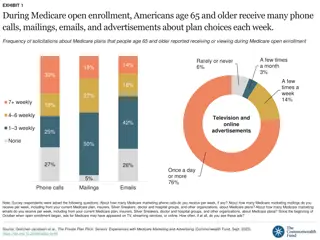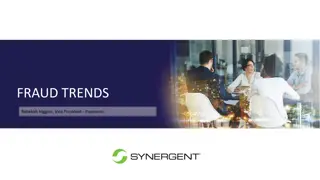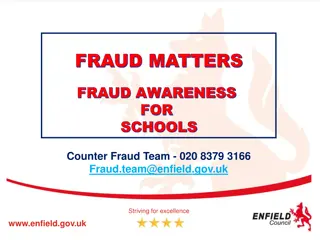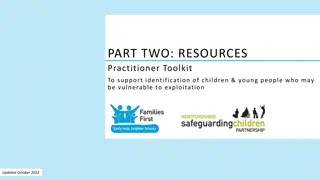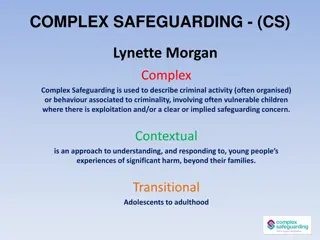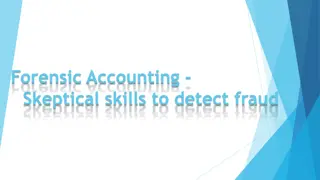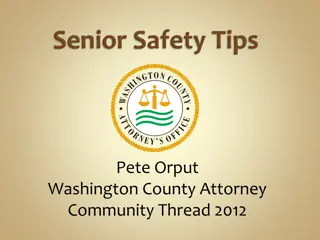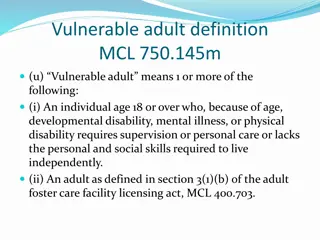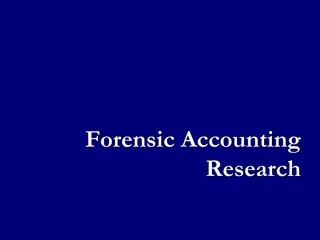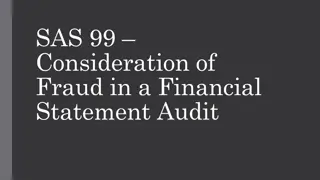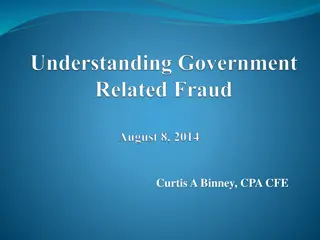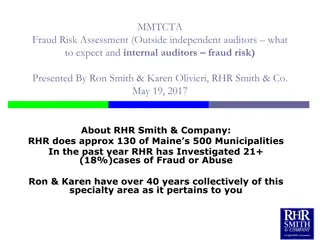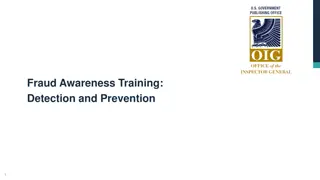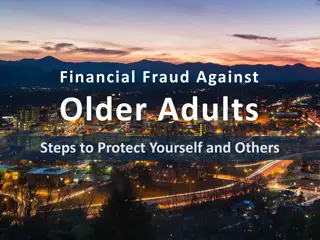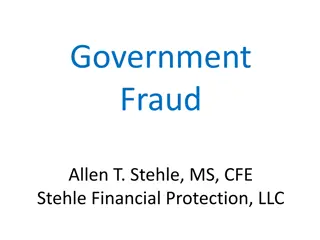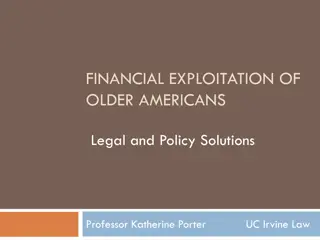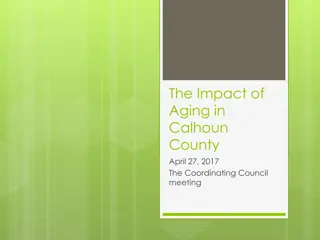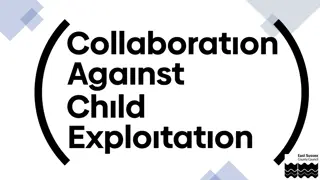Empowering and Educating Seniors Against Fraud and Financial Exploitation
The Office of Senior Protection in Kentucky is dedicated to equipping seniors with services and training to combat fraud, scams, and financial exploitation. With the increasing population of seniors, it is crucial to raise awareness about the tactics used by fraudsters and empower seniors to make informed decisions to protect themselves.
Download Presentation

Please find below an Image/Link to download the presentation.
The content on the website is provided AS IS for your information and personal use only. It may not be sold, licensed, or shared on other websites without obtaining consent from the author.If you encounter any issues during the download, it is possible that the publisher has removed the file from their server.
You are allowed to download the files provided on this website for personal or commercial use, subject to the condition that they are used lawfully. All files are the property of their respective owners.
The content on the website is provided AS IS for your information and personal use only. It may not be sold, licensed, or shared on other websites without obtaining consent from the author.
E N D
Presentation Transcript
OFFICE OF SENIOR PROTECTION Empowering and Educating Seniors of the Commonwealth
The Office of Senior Protection will be responsible for administering and offering a triage of services and training, to equip senior Kentuckians, and collaborating senior stakeholders in protecting them against fraud, scams, and financial exploitation occurring across the Commonwealth.
By 2030, 20.8% of Kentucky residents will be over the age of 60, compared to 14% in 2012.
FTC estimates 48.7 million incidents of fraud every year. Many never report the victimization. Attorney General s Office receives several calls daily from either victims, or persons reporting . Many victims are repeat victims.
Successful cons are clever, disciplined and highly skilled. Masters of persuasion either by phone, mail ,in person or online. They match the psychological profiles of their targets. Ask seemingly benign questions target health, family, religion, political views, hobbies, etc. (affinity).
Frauds vary, but similar tactics are used: Gaining victims trust and confidence. Inducing victims to take the bait or provide information.
To get the victim to make an EMOTIONAL DECISION instead of a RATIONAL DECISION
EXCITEMENT GUILT SHAME FEAR GREED
If it sounds too good to be true.. Fraudsters make their living by making sure deals they tout appear both good and true. Wehave to be able to determine when good becomes too good.
To add your residential and/or cell phone, call the National Do Not Call Registry, call 1-888-382-1222 or register online at www.donotcall.gov Note: Scammers do not abide by the federal no call list. Scammers also spoof caller IDs and use untraceable phone numbers and cell phones. You can purchase a phone app for as little as 99 cents to spoof . The FTC receives anywhere from 250,000 to 300,000 complaints per month. Calls with pre- recorded messages are responsible for around 60 percent of those complaints.
Caller claims to be from the Jefferson County Sheriff s Department and informs you that there is a warrant for your arrest for not appearing for jury duty. Caller instructs the victim they must pay fees to the court. The caller keeps the victim on the phone as they purchase pre-loaded debit cards or I-Tune cards and the victim reads the card numbers to the caller MONEY IS GONE!
Victim receives a call from someone claiming to be from the IRS. The caller threatens the victim with arrest due to unpaid back taxes. CALLER REQUESTS PAYMENT BY GREENDOT, MONEY CARD, I-TUNES Report to the Treasury Inspector General for Tax Administration: 800-366-4484 OR www.tigta.gov
Your own number shows up on caller id. This is a gimmick to entice you to answer the phone. Caller either uses threat tactics to scare you to react, or the caller uses element of excitement to get you to send money.
A term is used for emails that claim to be from your bank, a reputable business or a government agency Criminals ask for personal information such as Social Security numbers or account numbers to steal funds and/or steal identities
Youre told that youve won a sweepstakes or the Canadian lottery You re asked to pay for processing, taxes or delivery, or provide a bank account number to verify your identity No one ever receives a penny except for the thieves
Predators use online dating sites and social media to meet potential victims. They create fake profiles to build online relationships, and eventually convince people to send money in the name of love. Once the predators build a trusting relationship with their victim, requests are made of the victim: transfer of money, accepting money into own account, purchasing pre-paid cards, sending cell phones, etc.
Grandma/Grandpa, do you know who this is? I need help. I am traveling in Mexico and was involved in a traffic violation and need money wired to pay the fine. Don t tell mom and dad. Actually, caller makes grandparent believe it is grandson/daughter and instructs the grandparent to wire money.
Caller attempts to obtain personal information to make unauthorized withdrawals and switch bank account numbers. Green Dot card transactions being used to steal SS checks. This is the Social Security office and we are having problems direct depositing your social security check.
Caller claims to be from Microsoft and has detected a virus on your computer. Instructs you to log on to your computer and type in information which will allow them access into your computer. Once they have access, they can install malicious software, steal information stored, follow your every move, etc.
Caller claims that you qualify for a guaranteed government grant because you: paid your taxes on time, have never been arrested, never filed bankruptcy, or are a good citizen. Caller asks for an upfront fee for processing which will be reimbursed . You send money, and you have lost your money!
Are the bills unpaid? Are there impending utility shut-offs? Is the person in danger of eviction or foreclosure? Is the person without necessities such as food or clothing? Receives, responds to & saves junk mail, sweepstakes, etc. Little understanding of technology Secretive Phone Conversations Wire Service Receipts Prepaid Card Receipts (i-Tunes, Green Dot, etc.)
FOLLOW A HOUSE POLICY: NO personal information given to unsolicited callers, and NO commitments made by phone. NO emotional decisions made Step back and re- think the logistics of what you are being told! No engaging in conversation with unknown callers!
OSP will administer services by creating an informational and networking resource hub and developing and maintaining a communication infrastructure, for area agencies on aging groups, and other collaborating partners across the Commonwealth.
Text KYOAG Scam to GOV311 (468311)
Provide ongoing training services for collaborative agencies and partner with other branches in the OAG to present at their various conferences and programs
Facilitate statewide services with collaborative partners to address the needs of senior Kentuckians
Department of Justice launched 10 Regional Elder Justice Task Forces across the Nation
SENIOR SUMMIT OCTOBER 19TH, 2016 Administrative Office of the Courts
Gerina Whethers, Director gerina.whethers@ky.gov (502) 696-5393 Lori Farris, Branch Manager lori.farris@ky.gov (502) 696-5394
OAG ELDER ABUSE HOTLINE 877 ABUSE TIP (817.228.7384) CONSUMER PROTECTION HOTLINE 888.432.9257


